This editorial first appeared in the 16 May 2023 issue of our newsletter, Central Asia Concise. If you would like to subscribe to Central Asia Concise, or any other of our newsletters, please click here.
The Chinese city of Xi'an will host the first China-Central Asia summit on 18 and 19 May. "The Central Asian governments are expected to also profess eternal friendship with their Chinese hosts. But they are equally determined to develop their relations with the west, including the US and the EU, and will resist any attempt by China to hinder this process," writes commonspace.eu in this editorial.
"Certain extraterritorial countries fomenting dissension between Central Asian countries, China and Russia will only make themselves 'country non grata' in the region", wrote Global Times, a Chinese government mouthpiece, in a commentary on Tuesday (16 May) ahead of the opening of the China-Central Asia summit taking place in Xi'an, in China’s Shaanxi Province on 18 and 19 May.
The Chinese propaganda organ said that the summit, to be chaired by China’s President, Xi Jinping, is expected to open a new chapter for China's relations with Central Asian countries.
The China-Central Asia Summit marks the "first major diplomatic event that China will host this year" and will be the first ever in-person summit between the leaders of China and five Central Asian countries since the establishment of diplomatic relations 31 years ago, and Chinese observers say it will "usher in a new chapter of China's relationship with Central Asia".
The city of Xi’an, once considered the starting point of the Silk Road that stretched from China across Central Asia into Europe, has been preparing for the summit for months. Shiny new taxis, multilingual announcements at the train station, blossoming decorative flowers, and colourful billboards, adorn the city as it awaits the arrival of the Central Asian leaders.
The timing of the summit is also important – coinciding as it does with the summit of the G7 countries taking place in the Japanese city of Hiroshima on exactly the same days. The Chinese put a lot of emphasis on symbolism, and their summit with their Central Asian neighbours is a response to what they see as external meddling in Asian affairs.
The Central Asian governments are expected to also profess eternal friendship with their Chinese hosts. But they are equally determined to develop their relations with the west, including the US and the EU, and will resist any attempt by China to hinder this process.






